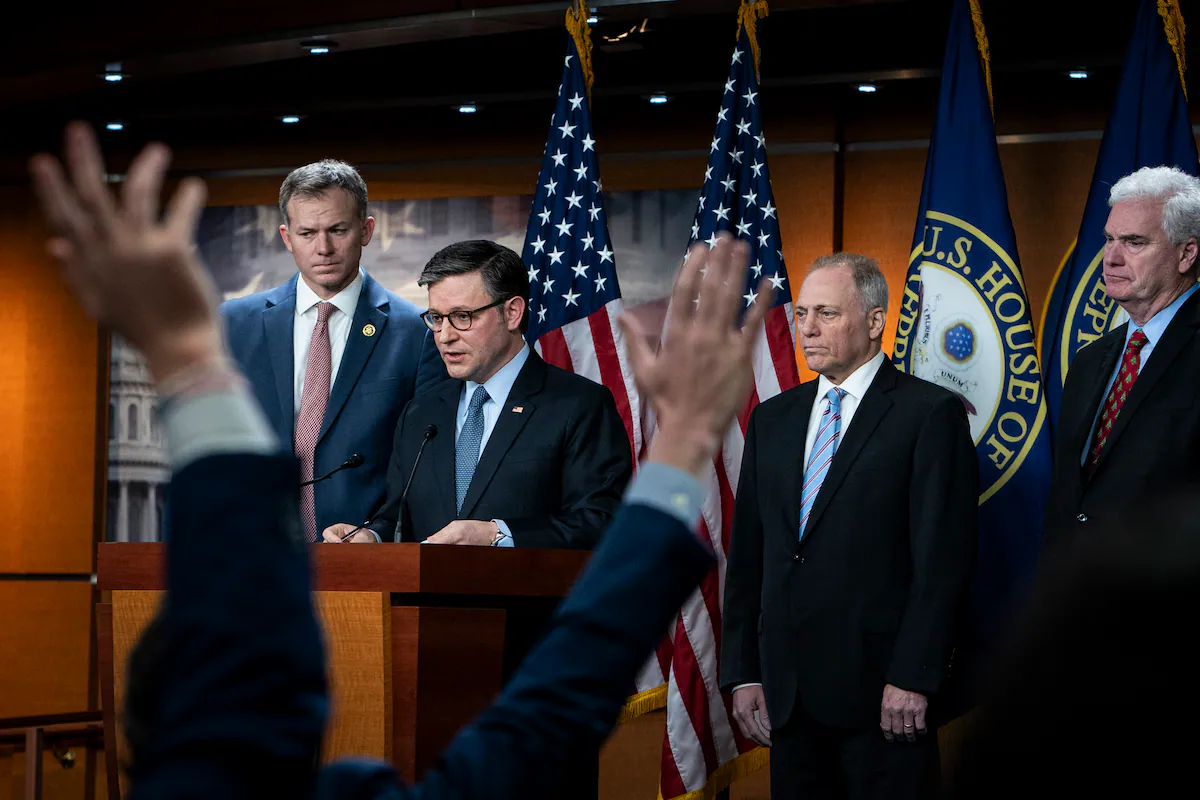
Utah’s only member of congressional leadership says the federal government may soon shutter.
“I believe we are on track for a shutdown,” Rep. Blake Moore, a Republican who represents Utah’s 1st Congressional District and serves as the House Republican vice chair, wrote in his weekly newsletter Thursday.
Moore added the shutdown will start Wednesday unless lawmakers finalize the 12 appropriations bills — which he says won’t happen — or the U.S. Senate passes the continuing resolution the U.S. House passed earlier this month.
Moore’s warning came as a standoff between President Donald Trump and Democratic leaders escalated, with Trump threatening to lay off federal workers and refusing to meet with minority leaders to negotiate a deal.
“After reviewing the details of the unserious and ridiculous demands being made by the Minority Radical Left Democrats in return for their Votes to keep our thriving Country open, I have decided that no meeting with their Congressional Leaders could possibly be productive,” Trump wrote on his social media platform, Truth Social, earlier this week.
Last week, the House of Representatives passed a short-term funding bill — known as a continuing resolution, or CR. The measure failed in the Senate, where Republicans need at least seven Democrats to cross the aisle and close debate in order to pass any government funding measures.
Lawmakers have been away from Washington this week. When they return Monday, they have just two days before funding for many government programs runs out to make a deal and avoid a shutdown.
At the heart of the fight, as Moore noted, is a demand from Democrats that lawmakers extend enhanced premium tax credits that help millions of Americans afford Affordable Care Act coverage, which are set to expire at the end of the year, as well as a push for the restoration of health care funding cuts passed as part of the “Big Beautiful Bill” that could put the health coverage of an estimated 188,000 Utahns at risk.
A government shutdown would mean that many non-essential government services would shut down, and the closure could make a mess of air travel, halt food safety and environmental inspections and leave many thousands of federal workers furloughed or forced to work without pay. In Utah alone, there are about 34,000 to 41,000 workers employed by the federal government.
Utah’s five national parks could also be hit particularly hard and would likely be forced to close, a move that costs the parks an estimated $500,000 per day, according to The National Parks Conservation Association.
Moore, whose district contains Hill Air Force Base, said he was particularly concerned about the possible impact on his constituents.
“A shutdown is especially painful for the First District with our many government employees and services, and I’m hopeful we come to a resolution quickly,” he wrote Thursday.
Moore said he understands Democrats using their rare opportunity for leverage as the minority party, but that doing so is “not in the best interest of the country to withhold critical funding to our federal programs and workers.”
Utah Republicans blame Democratic peers
In a response to a request for comment Friday, a spokesperson for Moore pointed to his newsletter. Sens. Mike Lee and John Curtis, as well as Utah Reps. Mike Kennedy, Celeste Maloy and Burgess Owens did not respond to requests for comment from The Salt Lake Tribune regarding the possible shutdown.
In her weekly newsletter Friday afternoon, though, Maloy wrote that the shutdown is “easily avoidable and unnecessary,” even though the odds of it happening “look pretty high right now.”
“So far, [Democrats] haven’t entered into any real negotiations. Whether we shut down or not is on them,” Maloy added. “I think it’s time to negotiate. Shutdowns aren’t good for Americans. They are not good for our military. They are not good for the morale of federal workers. They’re not good for our standing on the world stage.”
Owens, meanwhile, shared a video compilation Thursday of previous comments Democrats had made about the negative impacts of government shutdowns.
“House Republicans,” he wrote, “passed a clean, short term CR to keep the government open.”
He added, “Dems should listen to their own advice!”
Owens was incorrect regarding the number of Democrats who voted against the resolution. One, Rep. Jared Golden of Maine, voted in favor, while two Republicans, Reps. Thomas Massie of Kentucky and Victoria Spartz of Indiana, voted against.
Lee, on his prolific personal X account, made a series of posts calling for the full repeal of the Affordable Care Act, and shared a photo of Senate Minority Leader Chuck Schumer, D-N.Y., and wrote, “Do you trust this man?”
The last government shutdown lasted 35 days from late 2018 to early 2019. It was a partial shutdown largely related to funding for Trump’s proposed border wall, and the longest partial shutdown in U.S. history. The last full shutdown was in 2013, backed in large part by Lee, who joined with other members of the tea party movement in an attempt to repeal the ACA.
Democrats threatened to stand together earlier this year and force a shutdown in an effort to undermine Trump’s funding priorities, but Schumer ultimately folded and voted with Republicans to keep the government open.
Some Democrats, Politico reported Friday, are concerned the same thing could happen this fall, though House Minority Leader Hakeem Jeffries told the outlet he is “very confident” Schumer and the party will stick together this time around.
Jeffries also pushed back against the argument from Maloy, Owens and other congressional Republicans who have said that any government shutdown — and any negative impacts from it — would be the fault of the minority party.



